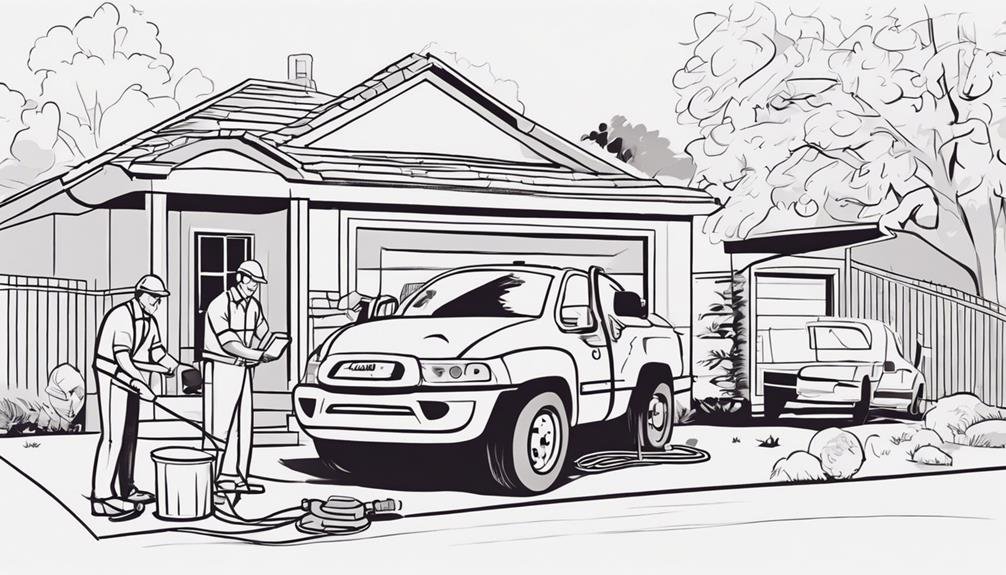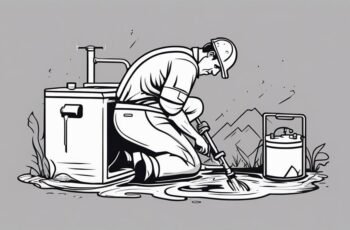Wondering how to keep your septic system running smoothly? Maintaining your septic system is crucial for its longevity, but do you know the top 5 tips that can help you avoid costly repairs and ensure efficient operation?
From regular inspections to monitoring water usage and being cautious about what goes into your system, these tips are essential for any septic system owner.
Stay ahead of potential issues and learn how to best care for your septic system to prevent unexpected problems down the line.
Key Takeaways
- Pump your tank every 3-5 years to avoid backups and extend system life.
- Schedule routine inspections for early issue detection and proactive care.
- Monitor water usage to conserve water and prevent overloading the system.
- Be mindful of what goes in; avoid chemicals and dispose of waste properly for system health.
Importance of Regular Maintenance

Regularly maintaining your septic system is crucial for ensuring its optimal functionality and longevity. By taking preventive measures such as pumping your tank every 3-5 years, you can avoid costly repairs and extend the life of your system. Neglecting maintenance can lead to backups, foul odors, and potential environmental hazards. Investing time and resources into regular upkeep will offer long-term benefits by keeping your system running smoothly and efficiently.
Incorporating simple habits like being mindful of what you flush down the drains, such as avoiding harsh chemicals or disposing of non-biodegradable items, can significantly impact the health of your septic system. These small adjustments can prevent clogs and reduce the strain on your system, contributing to its overall longevity.
Schedule Routine Inspections
To ensure the continued health and efficiency of your septic system, it's vital to schedule routine inspections by a qualified professional. Regular check-ups are essential for identifying any potential issues before they escalate into costly problems. By adhering to a maintenance schedule, you can prolong the lifespan of your septic system and prevent unexpected breakdowns. During these inspections, the professional will assess the overall condition of your system, check for signs of leakage, and ensure that all components are functioning correctly.
Key Points:
- Early Detection: Regular inspections help in early detection of any issues, saving you from expensive repairs down the line.
- Preventive Maintenance: By sticking to a maintenance schedule, you can proactively address any concerns and keep your septic system running smoothly.
- Professional Assessment: Qualified professionals have the expertise to thoroughly inspect your system, giving you peace of mind about its current state.
Monitor Water Usage

Monitoring water usage is a crucial aspect of septic system maintenance to ensure efficient operation and prevent overloading. Conserving water not only benefits the environment but also helps in maintaining a healthy septic system. Keep an eye out for any unexpected increases in your water bill, as this could indicate a leak in your plumbing system. Regularly inspect faucets, toilets, and pipes for any signs of leaks and promptly address them to prevent unnecessary strain on your septic system. Installing low-flow fixtures can also aid in water conservation efforts.
Leak detection is another essential aspect of monitoring water usage. Check your septic system area for any wet spots or unusually lush patches of grass, as these could be signs of a leak in the system. By promptly addressing leaks and practicing water conservation habits, you can prevent overloading your septic system and prolong its lifespan. Remember, being mindful of your water usage not only benefits your septic system but also contributes to a more sustainable environment.
Be Mindful of What Goes In
Mindfully controlling what substances are introduced into your septic system plays a crucial role in its proper functioning and longevity. Proper disposal and waste management are key factors in maintaining a healthy septic system. Here are some tips to help you be mindful of what goes into your system:
- Avoid Harsh Chemicals: Refrain from pouring harsh chemicals like bleach, paint, or strong cleaners down the drain as they can disrupt the bacterial balance needed for waste breakdown.
- Limit Grease and Oil: Grease and oil can solidify in the septic tank, leading to clogs and reduced efficiency. Dispose of excess grease in the trash instead of washing it down the sink.
- Watch What You Flush: Only flush biodegradable and septic-safe toilet paper. Items like wipes, feminine hygiene products, and medications can harm the system and should be disposed of in the trash.
Professional Pumping Services

For efficient septic system maintenance, consider scheduling regular professional pumping services to ensure optimal functionality and prevent potential issues. Professional pumping services involve removing accumulated solids from the septic tank, preventing clogs, and ensuring proper system operation. By having your septic tank pumped by professionals on a routine basis, typically every 3-5 years depending on usage, you can avoid costly emergency repairs and keep your system running smoothly.
In addition to preventing issues like backups and overflows, professional pumping services also play a crucial role in maintaining the health of your drain field. When the septic tank becomes too full, solids can flow into the drain field, causing clogs and potentially damaging the soil's ability to effectively filter wastewater. Regular pumping helps prevent this scenario, preserving the longevity of your drain field and avoiding expensive repairs.
Frequently Asked Questions
Can I Use a Garbage Disposal With a Septic System?
You can use a garbage disposal with a septic system if you follow proper maintenance guidelines. Opt for septic system-friendly appliances to ensure smooth operation. Regular maintenance and mindful use will help keep your system running efficiently.
How Do I Know if My Septic System Is Failing?
When your septic system falters, it whispers through slow drains, foul odors, and soggy spots in your yard. Stick to your maintenance schedule diligently; it's your guide to catching warning signs early.
What Are Some Common Signs of a Clogged Septic System?
If you notice slow drains, gurgling sounds, foul odors, or sewage backup in your household, these are warning signs of a clogged septic system. Regular maintenance and proper disposal habits can prevent issues. Solutions include professional cleanings and repairs.
Are There Any Specific Cleaning Products I Should Avoid Using With a Septic System?
Using harmful chemicals in cleaning products can disrupt your septic system's natural balance. Stick to septic-safe options for proper maintenance. Avoiding these pitfalls ensures your system runs smoothly, saving you money and headaches.
How Often Should I Have My Septic System Inspected by a Professional?
You should have your septic tank inspected by a professional every 3-5 years. Following a regular maintenance schedule helps prevent costly issues. Keep track of when your last inspection was to ensure your system continues to function properly.
Conclusion
In conclusion, by following these top 5 tips for septic system maintenance, you can ensure the longevity and efficiency of your system.
One example of the importance of regular maintenance is a homeowner who neglected their septic system, leading to a costly repair bill and inconvenience.
By staying proactive and scheduling routine inspections, monitoring water usage, being mindful of what goes into your system, and utilizing professional pumping services, you can avoid potential issues and keep your septic system running smoothly.

